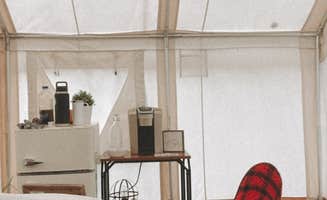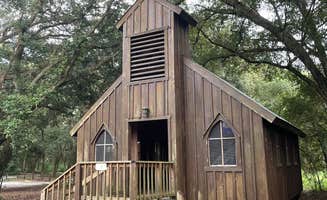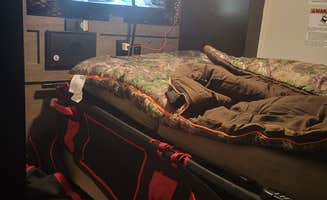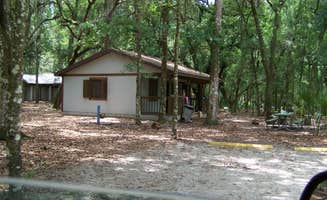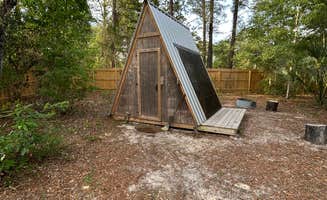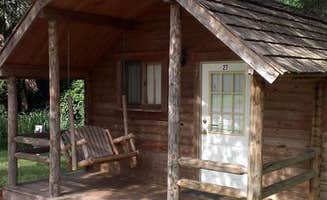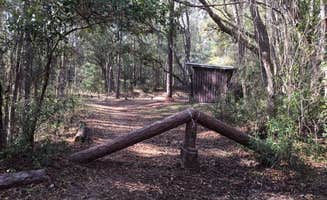Glamping near Lee, Florida offers climate-controlled accommodations throughout Central Florida's subtropical weather zone, where summer temperatures often exceed 90°F with high humidity. Winter brings milder conditions with daytime temperatures averaging 70°F, making November through March the most comfortable camping season. During summer months, afternoon thunderstorms frequently roll through the region, requiring proper shelter and weather awareness.
What to do
Paddling adventures: 3 distinct lakes at Lake Louisa State Park Campground provide multiple kayaking options within one location. The park features rolling hills unusual for central Florida and accessible waterways. "We were easily able to roll our Kayaks to Dixie lake from our campsite. Hammond lake was across the road from our campground," notes one visitor.
Wildlife observation: 150+ bird species populate Jay B. Starkey Wilderness Park, making it ideal for birders. The park spans nearly 10,000 acres with diverse ecosystems. "We saw raccoons, dolphin, manatee, tons of tons of Birds!" reports one camper at nearby Fort De Soto. Starkey Park offers similar wildlife viewing with "plenty of critters and beautiful trails to walk."
Historic exploration: Class 2 rapids at Hillsborough River State Park provide a rare Florida geological feature. The park preserves old Florida ecosystems with hiking trails through dense hammock forests. A visitor mentioned, "A beautiful park that is a real taste of old Florida, with a campground that is completely shaded by oak trees. At night the green fireflies put on an amazing light show in the canopy."
What campers like
Private waterfront sites: First-come camping at E.G. Simmons Regional Park offers water views and easy water access. Many sites directly border the shoreline with convenient launch points. "Nearly every campsite is right on the water - easy in and out for kayaks, large boat ramp and many picnic pavilions. Great trails for bike riding and wonderful for saltwater fishing among the mangroves," shares a regular visitor.
Dark skies for stargazing: Limited light pollution at Withlacoochee River Park creates opportunities for astronomy. The park has an astronomy field specifically designated for stargazing activities. One camper reports, "This place is quiet and dark at night!" while another mentions the park offers "peaceful, clean, natural environment."
Concrete pads for stability: Level camping surfaces at Quail Run RV Park provide reliable foundations regardless of weather. Sites feature full hookups and cable TV connections. "Very nice park. Level concrete pads. Ours was pull through. Gated. Mix of permanent residents and rentals," reports one camper, while another mentions, "We stayed at Quail Run for a weekend in October... we were pleasantly surprised with the very nice site with full hook ups and cable."
What you should know
Insect preparation: Mosquito population peaks during summer months, particularly at dusk. Bringing appropriate insect repellent is essential between May and September. One camper at Hillsborough River warned, "The mosquitoes were ridiculous in June. We practically had to anchor our toddler to the picnic table so he wasn't carried away by them."
Seasonal flooding: Trail conditions change after heavy rains, particularly in preserves protecting watershed areas. Some paths may become temporarily inaccessible during rainy season. At Upper Hillsborough Preserve — Alston Tract, one visitor mentioned, "We stayed here for a few nights but our reservations were cut short due to flooding," highlighting the importance of weather awareness.
Reservation requirements: Campsite availability varies significantly between weekdays and weekends. Many parks require advance booking, especially during winter months. A camper at Jay B. Starkey noted, "I went on a Friday night, and the entire campground was PACKED. Very loud, too many tents packed into each site."
Tips for camping with families
Playground access: Two dedicated play areas at Withlacoochee River Park offer recreation spaces for children of different ages. The playgrounds provide entertainment options beyond traditional outdoor activities. One visitor mentioned, "There are 3 loops one for guests with pets. BRING YOUR RABIES VACCINE PAPERS!"
Educational opportunities: Wildlife viewing platforms at several parks feature interpretive signage about local ecosystems. These areas provide structured learning experiences about Florida habitats. A visitor to Fort De Soto Campground shared, "Great park with days worth of activities! The historic fort, scenic beaches, trails for hiking or biking, etc made for a great visit!"
Off-season advantages: Winter camping offers more comfortable temperatures and fewer insects. School-year weekdays provide the quietest experience with fewer crowds. "We went in February and had comfortable hiking and biking. Good Verizon signal to allow for plenty of streaming," noted a Hillsborough River State Park visitor.
Tips from RVers
Dump station logistics: Morning congestion occurs at popular parks during checkout times. Planning dump station use for off-peak hours improves efficiency. A camper at Withlacoochee River Park mentioned, "They offer recycling, which is a great plus! It's nice and dark at night."
Satellite reception considerations: Tree cover affects signal reliability at most natural camping areas. Sites along field edges often provide better reception while maintaining some shade. A visitor to Cypress Creek Preserve advised, "We are in a 24' class C and found a nice private area that was surprisingly level. Trailers are accommodated at the equestrian campground."
Power options: Electric service quality varies between campgrounds, with some offering 30-amp while others provide 50-amp service. Bringing appropriate adapters ensures compatibility. "We were told to stop back between 12:30 and 1 (Advise that check in is at 1pm, so getting in early is not a guaranteed or expected result)," noted one Fort De Soto camper, highlighting the importance of understanding park procedures.


